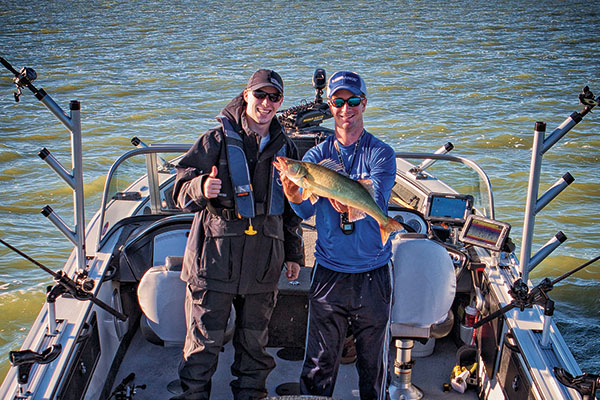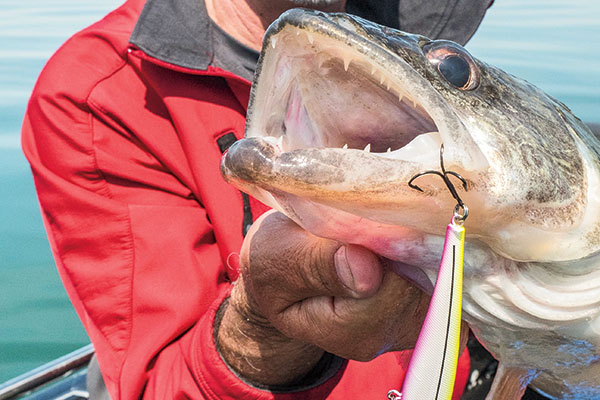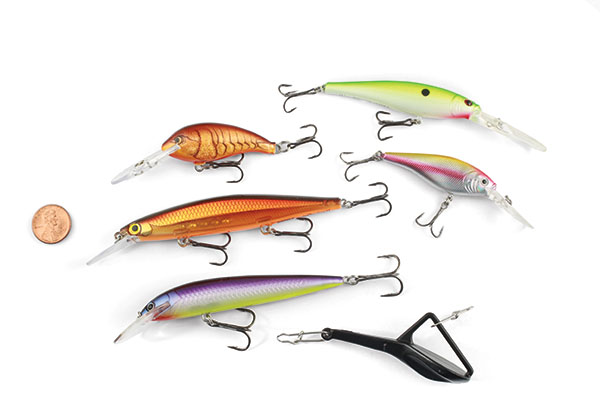
Shenanigans aside, interesting outcomes occur when you assemble large groups of fishermen into the same competitive confines. So it was about 1989 that legendary walleye pros Bob Propst Sr. and Mike McClelland found themselves pre-fishing what would be the Masters Walleye Circuit’s (MWC) first-ever visit to the marvelous Bays de Noc, Michigan. Bob’s son, Bob Propst Jr., was also practicing for the event, and had landed on a beehive of big fish.
Then-tournament director Jim Kalkofen recalls the mischief that followed: “Bob Jr. was excited about the school of fish he was on, but he was so paranoid other anglers might find it after that last practice day that he secretly placed a mallard duck decoy right near his spot—a rock point—to disguise it but still allow him to locate it [this before the era of Loran C and GPS].
“Having watched the sneaky act, McClelland and Propst Sr. waited until Jr. left the spot before moving in and executed ‘the plan,’” Kalkofen says. “The next day, when the tournament started, unbeknown to Propst Jr., the duck decoy now floated over a different, yet similar looking point a short way down the lake.
“But remarkably when Bob Jr. idled up to the decoy and started fishing, he immediately began catching walleyes on the ‘new’ spot—good ones. The point was so similar in appearance and apparently as productive as his original spot that he never missed a beat. No one knew anything questionable had occurred until McClelland and Propst Sr. finally came clean, having themselves won the tournament,” Kalkofen recalls.
Stories like this one and dozens of others from the pro walleye trail tend to stay, for the most part, “between friends.” What happens on the lake stays on the lake. But while some stories are better left untold, others deserve to see the light of day, including all the behind-the-scenes experimentation and sweat equity that often generates groundbreaking tackle and trends, which eventually trickles down to the angling public. Apart from early intelligence from the minds of Buck Perry and Bill Binkelman, many of the sport’s major breakthroughs have origins in competitive angling.

Thank pros Gary Parsons and Keith Kavajecz, for instance, for breakthroughs in precision trolling, planer boards, and adapting Great Lakes tactics to all waters. Mike Gofron shared a lot of knowledge on shallow water walleyes. The Jigging Rapala and other lures in this category were popularized for use on open-water walleyes through the tournament successes of the late Kim “Chief” Papineau and Perry Good, who early on each won big with the now popular lure. Advancements in using electronics come from legends like Bruce “Doc” Samson, who helped develop some of the early digital high-detail contour maps, and who taught us how to interpret sonar. And the legendary Gary Roach wrote the book—or at least several chapters—on rigging and jigging.
I’ve long resisted the notion that tournament anglers represented the best, most potent fish-catching force in all the sport. Indeed, there’s a legion of unsung anglers who don’t fish competitively, yet quietly go about catching loads of big walleyes on amazing and often overlooked methods. But for the most part, these folks don’t have a voice. Or don’t particularly care to share their discoveries. At the same time, tournament anglers can’t cherry pick nice days to fish; they fish on tournament days, which can coincide with horrible weather, high fishing pressure, and bad bites.
Kalkofen, 35-year veteran of the competitive walleye game and current manager of Target Walleye, an online community of fish heads, unwittingly dove into walleye tournaments while PR director for Mercury Marine in the early 1980s. He says, “Tournaments force anglers to resolve fishing problems, often in very bad conditions. The job of these anglers is to tell others how they caught their fish—it’s part of their obligation to sponsors. And they use a variety of media to convey their message. The result is that weekend anglers learn how to approach various situations by listening to the pros.”
So whether you appreciate or oppose competitive angling, there’s no denying its value. Under duress and the drive to win, tournament anglers are innovators by necessity. Great new tackle and technology results. The industry moves forward. The rest of us catch more fish in a wider range of waterbodies, conditions, and situations.

For roughly 5 to 10 years, innovations in the walleye game seemed to be at a standstill. Media covering walleye tournaments had mostly transitioned to niche online outlets. A disconnect developed between tournament proceedings and the everyday angler. Then, a few years ago, the Jigging Rap phenomenon appeared to put tournaments and walleye angling back on the collective angling radar.
“Even in the bass world, I don’t think we’ve seen a lure-based trend in recent years as big or as important as the Jigging Rap and the impact these jigging minnows have had on the walleye game,” says Gary Parsons, all-time tourney great and host of TV’s The Next Bite. The Jigging Rap is now Rapala’s best selling lure, and sales of lures in the same category like the Moonshine Lures Shiver Minnow, Custom Jigs & Spins Rotating Power Minnow, Lunkerhunt’s Straight Up Jig, and Johnson’s new Johnny Darter, are exceeding expectations.
“When Chief (Papineau) nearly won a PWT event many years ago, In-Fisherman covered the story,” he recalls. “But the tournament occurred early in the spring, a time not associated with a strong jigging-minnow bite. It just didn’t translate to the way folks fished, so the story sort of fizzled.
“Meanwhile, Perry Good eventually admitted he’d been using Jigging Raps to produce his ‘overs’ (one big fish over a given slot limit, allowed per tournament day) for years,” Parsons says. “He always seemed to have a big fish in his limit, which we attributed to livebait rigging. Turns out, when Chief spilled the beans, Perry paid attention and kept the secret to himself for years, until he eventually showed Al Lindner. Once Al started talking Raps on TV, guys on the MWC notched a big win by fishing the baits on bridge pilings. From there, another win happened on Cass Lake in Minnesota, with guys just crushing fish.
“That got my attention, and prompted us to start fishing Moonshine Lures Shiver Minnows,” he says. “Keith Kavacejz won at Escanaba (Little Bay de Noc, Michigan) that year and I took second during the August…





